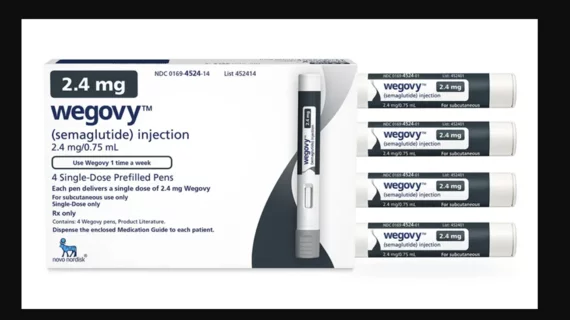Weekly treatments of semaglutide, a GLP-1 receptor agonist from Novo Nordisk originally developed to treat diabetes, are associated with reducing a patient’s major adverse cardiovascular event (MACE) risk by 20%, according to initial results from the SELECT trial.
Novo Nordisk is selling and marketing its weekly subcutaneous treatments of semaglutide 2.4 mg under the brand name Wegovy. Prior research has already confirmed Wegovy can help overweight and obese patients lose weight. This represents the first time a medication for weight loss also can significantly reduce a patient’s MACE risk.
The SELECT trial included more than 17,000 overweight or obese patients with a baseline age of 45 years or older. All patients had established cardiovascular disease (CVD), but no prior history of diabetes. Treatment with semaglutide was associated with a reduction in the study’s composite outcome—cardiovascular death, nonfatal myocardial infarction or nonfatal stroke—of 20% compared to a placebo. Semaglutide also was linked to a “safe and well-tolerated profile,” according to Novo Nordisk’s announcement.
“People living with obesity have an increased risk of CVD, but to date, there are no approved weight management medications proven to deliver effective weight management while also reducing the risk of heart attack, stroke or cardiovascular death,” Martin Holst Lange, Novo Nordisk’s executive vice president for development, said in a prepared statement. “Therefore, we are very excited about the results from SELECT showing that semaglutide 2.4 mg reduces the risk of cardiovascular events.”
Howard Weintraub, MD, a preventive cardiologist and clinical director of the Center for the Prevention of Cardiovascular Disease at NYU Langone Heart, worked as an investigator on the SELECT trial and is a consultant for Novo Nordisk.
“This is a very important study as no other weight loss medication has been shown to reduce cardiovascular events,” Weintraub told Cardiovascular Business. “It is likely that the beneficial impact of this drug goes above and beyond just weight loss.”
Novo Nordisk plans on seeking regulatory approval in the United States and Europe for this expanded indication. Additional details about the SELECT trial will be shared at a scientific conference in 2023.

